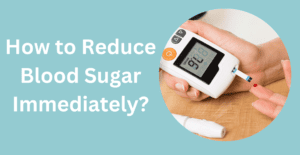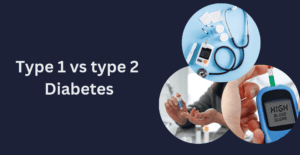Insulin-dependent diabetes, or type 1 diabetes, is characterized by little or no insulin production by the pancreas. Insulin is a hormone that allows sugar (glucose) to enter cells for energy production. Typically, type 1 diabetes develops in children, teens, and young adults, but it can occur at any age. Many factors, including genetics, as well as some viruses, can contribute to its development. There is no cure for type 1 diabetes. Treatment is aimed at managing sugar levels in the blood using insulin, diet, Diabetes Recipes, and lifestyle. Understanding the type 1 diabetes symptoms in adults(type one diabetes symptoms) and type 1 diabetes causes is important for preventing and managing the condition. In this article, we will explore the most common type 1 diabetes symptoms in adults and type 1 diabetes causes that contribute to its development. By gaining a deeper understanding of type 1 diabetes symptoms in adults, we can take steps to reduce our risk and lead healthier, happier lives.
Symptoms of Type 1 Diabetes
Millions of people worldwide suffer from type 1 diabetes, and early detection, understanding of type 1 diabetes causes, and diabetes treatment are crucial for preventing long-term complications. For prompt diagnosis and effective diabetes management, it is important to understand type 1 diabetes symptoms in adults and type 1 diabetes causes in adults and children.
It is possible for type 1 diabetes symptoms in adults to appear suddenly and may include:
- Feeling very hungry
- Losing weight without trying
- Urinating a lot
- Having blurry vision
- Feeling tired and weak
- Bed-wetting in children who have never wet the bed during the night
- Feeling more thirsty than usual
- Feeling irritable or having other mood changes
A complication known as diabetes-related ketoacidosis (DKA) can be life-threatening if a diagnosis of type 1 diabetes or type 1 diabetes causes identification is delayed for more than 3 weeks. If you or your child are experiencing any combination of the following type 1 diabetes symptoms, seek emergency medical attention immediately:
- Drowsiness
- Confusion
- Fruity-smelling breath
- Nausea and vomiting
- Rapid breathing
- Abdominal (stomach) pain
- Loss of consciousness
We encourage you to talk to your doctor if you experience any of these type 1 diabetes symptoms. Read our diabetes blogs to learn how to effectively manage type 1 diabetes.
Causes of Type 1 Diabetes
In type 1 diabetes, the immune system destroys the insulin-producing cells in the pancreas – a process that normally protects the body against harmful bacteria and viruses.
The exact type 1 diabetes causes are unknown. Although they are unsure of the precise origin of Type 1 diabetes, researchers think it has a significant genetic component. Without a history of the disease in the family, there is a 0.4% chance of contracting it. Your risk is 1% to 4% if your biological mother has Type 1 diabetes, and 3% to 8% if your biological father does. Your risk of getting Type 1 diabetes increases to 30% if both of your biological parents do.
In people who have a genetic predisposition for type 1 diabetes causes and developing type 1 diabetes, certain factors, such as viruses or environmental toxins, can trigger the immune system to attack pancreatic cells.
When To See A Doctor For Type 1 Diabetes
See a doctor right away if you experience any type 1 diabetes symptoms. The following are a few of the typical type 1 diabetes symptoms:
Skin problems – Any number of skin issues could be present if you have diabetes. Possible dryness and itching of your skin. You might notice that your lips are dry. You may have persistent skin infections or wounds that don’t heal.
Eating issues – You might be experiencing the early signs of diabetes if you have extreme thirst or hunger, or if you have trouble swallowing or eating.
Vision Problems – One early sign of diabetes that is quite typical is blurred vision. Your blood glucose levels start to rise as a result of this illness, and the fluid around your eyes thickens. It can therefore be challenging to see.
Mood problems – One rather typical early sign of diabetes is being excessively weary or irritable.
other health issues – Additional medical conditions you can face include frequent urination, extreme fatigue, and even dry mouth.
Numerous early signs of type 1 diabetes exist, although they’re not always clear-cut. It’s crucial to have your blood glucose checked frequently if you have diabetes risk factors or if someone in your family has the disease. Today, a quick diabetes test at home that just takes 30 minutes can be used to diagnose diabetes. The sooner you start treating your diabetes symptoms(type one diabetes symptoms), the less probable it is that you may acquire the disorder’s consequences.
Adults with type 1 diabetes can postpone or avoid the onset of type one diabetes symptoms with early diagnosis and treatment, which lowers the risk of long-term health issues. Read about science of diabetes for more information.
Risk Factors associated with Type 1 Diabetes
Type 1 diabetes is believed to be brought on by an immunological response (the body attacks itself by mistake). Compared to prediabetes and type 2 diabetes, type 1 diabetes risk factors are less well understood. Known risk elements consist of:
- Having a parent, sibling, or another family member with type 1 diabetes causes.
- Age – type 1 diabetes causes can occur at any age, but it most frequently strikes kids, teenagers, or young adults.
It’s crucial to remember that not everyone with risk factors will acquire type 1 diabetes, and many people with the disease don’t exhibit any obvious type one diabetes symptoms. However, people with risk factors ought to discuss their risk with their doctor in order to discuss the possibility of screening for type 1 diabetes causes and preventive steps. The illness is continually changing, new tools and treatments are being created, and significant strides are being made by researchers. People with type 1 diabetes are currently living full, robust lives at all ages. Be our next diabetes success story!
The Bottom Line
FAQs
Can Type 1 symptoms appear suddenly?
While type 2 diabetes symptoms and type 1 diabetes causes often appear more gradually and occasionally without any warning, type 1 diabetes symptoms(type one diabetes symptoms) can often appear very suddenly. Sometimes symptoms follow a viral infection. Before receiving a type 1 diagnosis, type 1 diabetes causes a person may occasionally have diabetic ketoacidosis (DKA). DKA happens when blood sugar levels are extremely high and insulin is not present, preventing the body from delivering nutrients to the cells. The accumulation of ketones in the blood and urine results from the body’s subsequent breakdown of muscle and fat for energy. A fruity stench on the breath and vomiting are signs of DKA. DKA can cause stupor, unconsciousness, and even death if it is not treated. Learn about Type 1 Diabetes Vs Type 2 Diabetes for better understanding.
What are the Early Signs and Symptoms of Type 1 Diabetes?
Type 1 diabetes symptoms include:
- extreme thirst
- frequent urine, including bedwetting in kids and frequent full diapers in newborns
- extreme hunger
- Unaccounted-for weight loss
- Fatigue
- distorted vision
- Cuts and sores heal slowly
- Yeast infections in the vagina
What are the common symptoms of Type 1 Diabetes?
Type 1 diabetes symptoms can vary based on your age and whether you have additional medical issues. Having said that, the majority of type 1 diabetics have the following symptoms prior to seeking treatment:
- Tiredness
- Increased or Unquenchable thirst
- Headaches
- Nausea and vomiting
- Increased urination
- Abdominal pain
- Wounds that won’t heal
- Distorted vision
What are warning signs of Type 1 Diabetes?
Some of the warning signs are:
- noticing a greater-than-normal thirst
- frequent urination
- weight loss without exerting effort
- ketones are present in the urine
- becoming worn out and fragile
- irritated or experiencing other mood swings
- having visual problems
- having wounds that take a long time to heal









